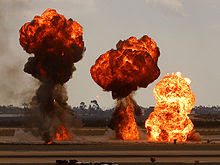The Power of Explosions: Causes, Impacts, and Consequences
Explosions have a mesmerizing and often destructive force that captivates our attention.
Whether natural or human-made, explosions can have significant consequences and shape the world around us.
In this blog post, we will dive into the intriguing realm of explosions, exploring their causes, impacts, and the measures taken to mitigate their effects.
Understanding Explosions: An explosion is a rapid release of energy in the form of a shockwave, resulting in a sudden increase in pressure and the release of gases, heat, and debris. Explosions can occur naturally, such as volcanic eruptions or meteor impacts, or they can be human-made, such as industrial accidents, military operations, or acts of terrorism.
Causes of Explosions: Explosions can arise from various causes, including:
a. Chemical Reactions: Certain chemical reactions, such as combustion or the rapid decomposition of unstable compounds, can generate explosive forces. Examples include fuel-air explosions, detonations of explosive materials, or industrial accidents involving hazardous chemicals.
b. Physical Processes: High-pressure vessels or containers that rupture due to excessive pressure build-up can lead to explosions. Similarly, the accumulation of combustible gases in confined spaces can result in explosive events.

c. Natural Phenomena: Natural explosions, like volcanic eruptions or the impact of large celestial objects like meteors, arise from the release of enormous amounts of energy stored within the Earth or extraterrestrial bodies.
Impacts and Consequences: Explosions can have wide-ranging impacts and consequences, including:
a. Loss of Life and Injuries: Explosions often result in casualties, causing severe injuries or even fatalities. The force of the blast, flying debris, and the release of toxic gases can cause immediate harm to individuals in the vicinity.
b. Property Damage: Explosions can cause extensive damage to buildings, infrastructure, and surrounding environments. The blast wave, heat, and flying debris can demolish structures, shatter windows, and disrupt utilities.
c. Environmental Impact: Explosions can release harmful substances, including pollutants, toxins, or radioactive materials, into the environment, leading to environmental degradation and contamination of air, water, and soil.
d. Psychological and Societal Effects: Explosions can have lasting psychological effects on individuals and communities. They can instill fear, trauma, and a sense of vulnerability. Communities may also face economic repercussions due to the destruction of businesses and disrupted livelihoods.
Mitigation and Safety Measures: To mitigate the impacts of explosions and enhance safety, various measures are implemented, including:
a. Risk Assessment and Prevention: Identifying potential hazards and conducting risk assessments can help prevent explosions by implementing safety protocols, monitoring systems, and maintaining equipment integrity.
b. Emergency Response and Preparedness: Developing robust emergency response plans, including evacuation procedures, first aid training, and communication systems, is essential for saving lives and minimizing damage in the event of an explosion.
c. Regulation and Compliance: Implementing and enforcing safety regulations and standards in industries, transportation, and storage of hazardous materials is crucial to reduce the likelihood of explosions.
d. Research and Development: Ongoing research and technological advancements contribute to the development of safer materials, improved engineering designs, and more efficient explosion-detection and mitigation systems.
Conclusion: Explosions, with their immense power and destructive capabilities, have a significant impact on our lives and surroundings. Understanding the causes, consequences, and mitigation measures associated with explosions allows us to better safeguard communities, infrastructure, and the environment. By prioritizing safety, preparedness, and technological advancements, we can work towards minimizing the risks and consequences of explosions, fostering a safer and more resilient world.
Visit Official Home Page



.jpg)
.jpg)

0 Comments